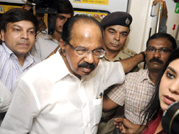
“My journey was pleasant. Hope it will start a movement,” he told a TV channel, little aware that several people were inconvenienced by his gesture. Commuters faced needless delays on their way to work. A 15-minute trip from the Race Course metro station to Central Secretariat took an hour.
Mediapersons made a beeline for Moily’s house for his comments. A five-minute walk to the Race Course station took half an hour as Moily explained how his action would spur fuel conservation at a time when the country was projected to import nearly 94 per cent of its crude in 2030.
The minister had said last month that as part of a fuel conservation drive to save $5 billion in oil import bill, he and Oil Ministry officials would take the public transport to work every Wednesday.
The first stumbling block to Moily’s initiative was the Finance Ministry, which called “ambitious” his claim to reduce the oil import bill by 3 per cent through such measures.
“While it is recognised that a conservation campaign might result in some reduction in petro product consumption, the estimates of savings projected at 3 per cent, over and above the proposed crude imports cut, appear to be ambitious,” the Finance Ministry had said. Joint secretaries Neeraj Mittal and Aramane Giridhar cycled 8 km to office. The 200-odd ministry staff also availed the public transport while most PSU staffers either took car pools or travelled by the metro or buses.
The Centre for Science and Environment (CSE) congratulated the minister on taking a step in the right direction. “Moily, make public transport a serious business for all—the rich and the poor—to save fuel, pollution and human lives. This is a good gesture, but the intent of it must not get reduced to a gimmick. It should catalyse significant change in commuting practices in the city,” CSE said.








Comments
Add new comment